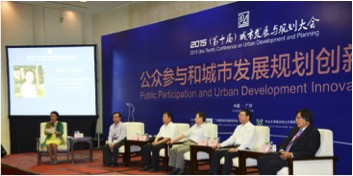
The 2015 (10th) Public Participation and Urban Planning Innovation Forum
On the 23rd July the Public Participation and Urban Development Innovation Forum was held in Guangzhou’s Baiyun International Convention Centre as part of the wider 2015 (10th) Conference on Urban Development and Planning.
In the globalised world cities vie for qualities that will make them internationally competitive and the degree of public participation a city enables is a great factor in measuring this competitiveness.
Guangzhou, more than most cities in China, has been successful in the innovation of public participation and the Tongdewei model of public consultation for development of urban areas, is often quoted as the landmark initiative behind this development.
Present on the forum’s panel were a respected group of experts in urban planning and innovation. They included: Mr. Qiu Baoxing, Counsellor of the State Council, Former Vice Minister of the Ministry of Housing and Urban-Rural Development, President of the Chinese Society for Urban Studies, and Chair of the China Urban Planning Association; Mr. Chen Rugui, on the Standing Committee of Guangzhou Municipal Party Committee and Executive Vice-Mayor; Mr. Li Jiangtao, Vice President of Guangzhou Institute for Urban Innovation, and Expert with Special Allowance of the State Council; Nicolas You, Chairman of the Urban Strategy and Innovation Council, ENGIE and Senior Adviser for the Guangzhou International Award for Urban Innovation, as well as Mr. Xiao Bin, Dean of the School of Government at Sun Yat-sen University. Professor He Yanling also from the School of Government at Sun Yat-sen University, acted as the moderator of the forum.
 Mr. Qiu was the first to emphasise his view that public participation is a key feature to urban international competitiveness. He praised the city as having “long been an inclusive city.” He also welcomed the turn-around of people who once left Beijing, Shanghai and Guangzhou but have now returned. Concerned with what we may call the ‘brain drain,’ Mr. Qiu stated that we are in a time of fierce urban competition and to remain successful and attract necessary resources for development, Guangzhou must concentrate on retaining and nurturing talents in case it becomes “marginalised…and left behind.”
Mr. Qiu was the first to emphasise his view that public participation is a key feature to urban international competitiveness. He praised the city as having “long been an inclusive city.” He also welcomed the turn-around of people who once left Beijing, Shanghai and Guangzhou but have now returned. Concerned with what we may call the ‘brain drain,’ Mr. Qiu stated that we are in a time of fierce urban competition and to remain successful and attract necessary resources for development, Guangzhou must concentrate on retaining and nurturing talents in case it becomes “marginalised…and left behind.”
Mr. Li brought the discussion round to the citizens. He explained that the public must first of all have a sense of self-awareness and to recognise their role as citizens with a need to contribute to development and governance. This civic awareness can be split into two aspects, right consciousness and obligation consciousness. He stated, “Rights and obligations are equal. Nowadays, people’s right consciousness is increasing, but, correspondingly, their obligations may not be that clear or strong.” Mr. Li also confidently stated that the lack of platforms for public participation should be addressed. It should be a priority that any major measures concerning urban governance should be allowed ample time to solicit public opinion.

Although Guangzhou city and other larger metropolis like Shenzhen and Zhuhai have taken a lead in participation with the enthusiasm of the people supporting the municipal governments, the larger Guangdong province hasn’t been as successful, as Mr. Xiao analysed. He recognised the Guangzhou media’s role in enhancing public opinion in favour of participation and its role as a guide to public knowledge in public affairs.
 Expanding on the media’s role in knowledge facilitation and public involvement, Nicolas You stated, “A good decision must be based on adequate and high-quality information.” An uniformed decision can be detrimental to policy so the relevant channels of communication must be opened for accurate information to be garnered.
Expanding on the media’s role in knowledge facilitation and public involvement, Nicolas You stated, “A good decision must be based on adequate and high-quality information.” An uniformed decision can be detrimental to policy so the relevant channels of communication must be opened for accurate information to be garnered.

In her concluding comments Professor He added that the main body of the citizenry can be divided into two parts, elites and the public. So, to take a city from developed to well-developed there must be a “platform for public participation where elites and the public can learn together and gain improvement.”

